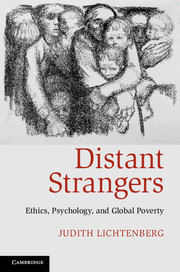Book contents
- Frontmatter
- Dedication
- Contents
- Preface
- Chapter 1 Introduction
- Chapter 2 Entanglements and the claims of mere humanity
- Chapter 3 Duties and rights, charity and justice
- Chapter 4 “Negative” and “positive” duties
- Chapter 5 Oughts and cans
- Chapter 6 Why people do what others do – and why that’s not so bad
- Chapter 7 Whose poor?/who’s poor?: deprivation within and across borders
- Chapter 8 Hopefully helping: the perils of giving
- Chapter 9 On motives and morality
- Chapter 10 Conclusion: morality for mere mortals
- Works cited
- Index
Chapter 6 - Why people do what others do – and why that’s not so bad
Published online by Cambridge University Press: 05 June 2014
- Frontmatter
- Dedication
- Contents
- Preface
- Chapter 1 Introduction
- Chapter 2 Entanglements and the claims of mere humanity
- Chapter 3 Duties and rights, charity and justice
- Chapter 4 “Negative” and “positive” duties
- Chapter 5 Oughts and cans
- Chapter 6 Why people do what others do – and why that’s not so bad
- Chapter 7 Whose poor?/who’s poor?: deprivation within and across borders
- Chapter 8 Hopefully helping: the perils of giving
- Chapter 9 On motives and morality
- Chapter 10 Conclusion: morality for mere mortals
- Works cited
- Index
Summary
I have been arguing that demandingness is relevant to determining what people morally ought to do or are obligated to do, and that it is not only unrealistic but unreasonable to expect ordinary mortals to make great sacrifices for others’ interests on a regular basis – to demand too much of them. Some might take this view as spelling doom for the prospect of remedying a pressing problem like global poverty, which appears too large to solve without heroic efforts on the part of mere mortals.
What this pessimistic conclusion ignores is that demandingness is not a fixed quantity. It is alterable, and we have some control over its dimensions. If that is true, we may be able to get more for less, so to speak, by making what would otherwise be demanding demands less demanding. Defending that proposition is the purpose of this chapter.
Some basic ideas
In a general sense the elasticity of demandingness can be understood in terms of the psychologist’s idea of situationism. Over the last fifty years, hundreds of studies have confirmed that seemingly small features of the situations in which people find themselves exert enormous influence over human behavior. Psychologists and others disagree about how far we should take situationism – to what extent, in explaining behavior, we should downplay deep-seated and fixed psychological traits relative to situational factors. Radical situationists virtually eliminate the role of character and personality, which to many appears implausible. But it is not controversial that “situations” play an important role in influencing what people do. Small and sometimes seemingly insignificant aspects of the situations in which people find themselves can greatly increase the likelihood that they will do A rather than B or A rather than not-A.
- Type
- Chapter
- Information
- Distant StrangersEthics, Psychology, and Global Poverty, pp. 122 - 149Publisher: Cambridge University PressPrint publication year: 2013



